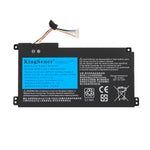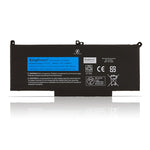You have no items in your shopping cart.
Laptop battery common faults and solutions - Nine Methods

As laptops become more popular, more and more people begin to rely on them for work, study, and entertainment. For example, among different types of laptops, gamers can choose gaming laptops with stronger performance, while office workers can choose business laptops that are lighter and more durable. But despite the widespread popularity and variety of notebook computers, the problem of depleted battery life is still an important challenge faced by many first-tier brands.
Because the loss of notebook battery life will cause many problems, thus affecting the user experience. So, what do you do when you have laptop battery issues? To answer those questions you may be concerned about, we’ve listed nine common battery failure issues below, along with corresponding solutions.
Common laptop battery failures and solutions
1.Battery percentage is not displayed accurately
Solution: Some users may encounter issues such as the battery level not being displayed accurately or the battery level remaining 100%. If you find that your laptop battery has this kind of problem, you can try recalibrating the battery. In Windows systems, you can use the system's built-in battery calibration tool to perform calibration; in Mac systems, you can perform battery calibration through some third-party software. In addition to this, you can also check the software and drivers that affect battery reporting to see if there are issues with them. Of course, if the above solutions do not improve the problem, you can consider replacing the battery with a new one.
2.The laptop automatically shuts down
Solution: The automatic shutdown of the notebook computer when running on battery power may be caused by the battery overheating. Most laptop batteries now have protection circuits. When the battery temperature is too high or the discharge current is too large, the battery will automatically power off to protect the battery and the laptop. So it is important not to let the computer overheat. To avoid overheating the laptop, keep the vents out of the way and try not to run under heavy load for too long.
3.The battery cannot be charged
Solution: First, check whether the charging cable, computer, etc. can be used normally. If the battery is rarely used, the idle time will cause the battery to passivate and lose its activity. You can ask the staff who repairs the battery to try to discharge the battery and recharge it. If it still doesn't work, the only solution is to replace the battery.
4. Laptops are aging seriously
The notebook can be used continuously within the battery life. When it is used for too long, the battery will reduce the use effect due to frequent use, and the lifespan will also be shortened. As a result, the battery will age seriously, affecting the power storage. Therefore, pay attention to the regular warranty when using the notebook. Batteries are consumables, and even normal use will lead to the gradual loss of activity of the battery cells, which is commonly referred to as the loss of battery life.
5.The laptop is charged incorrectly
When the notebook is charged incorrectly, it will have a serious impact on the battery, especially if it is plugged in multiple times, but unplugged before it is fully charged, or it is overcharged. Unreasonable charging will consume the battery excessively, affecting the service life of the battery, and the battery will be easily damaged. At this time, everyone should maintain good usage habits and unplug the power supply when the battery is fully charged.
6.The notebook is damp or exposed to the sun
If the notebook is placed in a humid environment, the notebook battery will be affected by moisture, and once the power is turned on, the battery will easily be burned out. In addition, if the notebook is placed in an environment exposed to sunlight, the notebook will also damage the battery cells due to excessive temperature, causing the battery to burn out. Therefore, when you use the computer, you should pay attention to placing the notebook in a safe environment to avoid damp or exposure to the sun.
7.Notebook cooling performance is not good
The poor heat dissipation performance of the notebook will also cause the battery to be burned out. Once the temperature of the battery is too high, it is easy to damage the battery components and cause battery failure. Therefore, when using the notebook for a long time, pay attention to cooling the notebook, or use a cooling device to assist.
8.Notebook quality problems
Laptops with poor quality often use inferior materials. If you buy inferior laptops, the battery will also have this problem. This requires everyone to choose carefully when purchasing, and go to a regular notebook sales store to buy.
9.Abnormal human error
Whether it is a cup of water splashing on the notebook or an abnormal mistake such as going out in the rain and getting damp, it can cause irreparable direct damage to the battery.

Common Laptop Battery Troubleshooting Tips
When you notice a problem with your battery, here are some basic troubleshooting steps you can take to help resolve some common laptop battery issues.

Acer Aspire 5/Swift 3 laptop battery-Kingsener AP18C8K | BatteryMall
1.Basic battery troubleshooting steps
- Check the power connection.Make sure the power cord is properly connected to the laptop and the power outlet. If the power cord is loose or damaged, it will most likely cause the laptop to fail to charge or run out of power quickly.
- Restart the laptop. While powered off, press and hold the power button for a few seconds and then release it, and the laptop will restart. Sometimes this simple method can solve some battery-related problems. Of course if the battery issue persists after a reboot, you may want to take a deeper look at the battery itself. Or consider other factors that affect battery life, such as drivers, device hardware, etc.
- Update device drivers.Drivers may affect the device's power management settings. Therefore, updating outdated device drivers can avoid some common battery failure issues.
2.Calibrate battery
Calibrating the battery is also an effective way to troubleshoot laptop battery problems. The steps are as follows:
- Completely discharge the battery.
- Fully charge the battery.
- Use battery calibration software to recalibrate the battery.
Calibrating your battery helps ensure the accuracy of your laptop battery and extends its lifespan. By calibrating the battery regularly, we can avoid some problems of premature battery aging or performance degradation.
Note: The exact steps for battery calibration may vary depending on your laptop model and manufacturer. So before performing battery calibration, you can consult the relevant user manual or contact technical support for accurate guidance.
3. Extend battery life
Taking relevant methods to extend battery life can help us avoid some laptop battery failure problems. For example, close unnecessary applications and processes when using your laptop, avoid exposing the device or battery to extreme temperatures, etc. These measures can help us effectively slow down the wear and tear of laptop batteries.
If you want to know more about extending laptop battery life, you can click: 10 Tips to Extend Your Laptop Battery Life.
4.Check for software conflicts
Checking software conflicts is also an important technical means to help us solve laptop battery problems.
- You can appropriately identify and delete some applications that are not commonly used but consume a lot of power.
- Update device software and operating system in a timely manner.
- Perform regular malware scans to avoid viruses and malware causing damage to battery life.
Some other common battery questions (FAQ)
1.Why won’t my laptop turn on even when plugged in?
There are many reasons why your laptop won't turn on. For example, the device's power plug or power adapter fails, the laptop battery is damaged, the device hardware fails, etc. You can try troubleshooting the battery and power supply, or seek professional help.
2.What are the signs of a failing laptop battery?
Signs of laptop battery failure include: the battery swells, the battery cannot be charged, the battery always heats up easily when charging, etc.
3. How to tell if my laptop battery needs to be replaced?
Check your laptop battery for the common faults we talked about above. Or you can also observe whether there are bulges, deformations, leaks, etc. on the appearance of the laptop battery. If so, it most likely means that the battery is damaged and you need to replace it with a new one in time.
4. How often should I calibrate my laptop battery?
We do not recommend that you perform frequent battery calibration operations, because frequent discharges can easily shorten the battery life. You can calibrate your laptop battery every three months.
Related articles about battery calibration: Why do we need battery calibration?
All in all, laptop batteries are a critical component of modern laptops. We can maintain battery health, extend battery life, and avoid battery failure problems by taking appropriate measures. This can bring us a more stable, reliable and long-lasting laptop experience.
Finally, if you want to know more about batteries, please visit: BatteryMall.com/blogs/support









comments (2)